#nyc street scene diorama
Explore tagged Tumblr posts
Text






#adult collectors#adult collectibles#collectables#toys#action figures#figures#playset#teenage mutant ninja turtles#tmnt#neca#neca store exclusive#nyc street scene diorama#pre order#nickelodeon
4 notes
·
View notes
Text
3D, Part 2: How 3D Peaked At Its Valley by Vadim Rizov
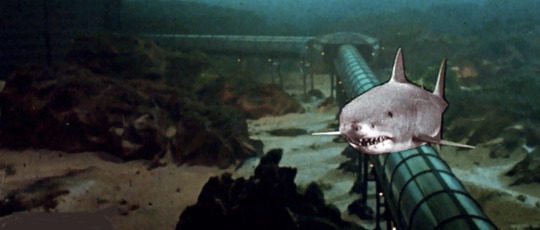
I didn’t expect to spend Thanksgiving Weekend 2018 watching ten 3D movies: marathon viewing is not my favorite experience in general, and I haven’t spent years longing to see, say, Friday the 13th Part III, in 35mm. But a friend was visiting, from Toronto, to take advantage of this opportunity, an impressive level of dedication that seemed like something to emulate, and it’s not like I had anything better to do, so I tagged along. Said friend, Blake Williams, is an experimental filmmaker and 3D expert, a subject to which he’s devoted years of graduate research and the bulk of his movies (see Prototype if it comes to a city near you!); if I was going to choose the arbitrary age of 32 to finally take 3D seriously, I couldn’t have a better Virgil to explain what I was seeing on a technical level. My thanks to him (for getting me out there) and to the Quad Cinema for being my holiday weekend host; it was probably the best possible use of my time.
The 10-movie slate was an abridged encore presentation of this 19-film program, which I now feel like a dink for missing. What’s interesting in both is the curatorial emphasis on films from 3D’s second, theoretically most disreputable wave—‘80s movies with little to zero critical respect or profile. Noel Murray considered a good chunk of these on this site a few years ago, watching the films flat at home, noting that when viewed this way, “the plane-breaking seems all the more superfluous. (It’s also easy to spot when these moments are about to happen, because the overall image gets murkier and blurrier.)” This presumes that if you can perceive the moments where a 3D film expands its depth of field for a comin’-at-ya moment and mentally reconstruct what that would look like, that’s basically the same experience as actually seeing these effects.

Blake’s argument, which I wrestled with all weekend, is that these movies do indeed often look terrible in 2D, but 3D literally makes them better. As it turns out, this is true surprisingly often. Granted, all concerned have to know what they’re doing, otherwise the results will still be indifferent: it turns out that Friday the 13th Part III sucks no matter how you watch it, and 3D’s not a complete cure-all. This was also demonstrated by my first movie, 1995’s barely released Run For Cover, the kind of grade-Z library filler you’d expect to see sometime around 2 am on a syndicated channel. This is, ostensibly, a thriller, in which a TV news cameraman foils a terrorist plot against NYC. It features a lot of talking, scenes of Bondian villains eating Chinese takeout while plotting and/or torturing our ostensible hero, some running (non-Tom Cruise speed levels), and one The Room-caliber sex scene. Anyone who’s spent too much time mindlessly staring at the least promising option on TV has seen many movies like these. The 3D helps a little: an underdressed TV station set takes on heightened diorama qualities, making it interesting to contemplate as an inadvertent installation—the archetypal TV command room, with the bare minimum necessary signifiers in place and zero detail otherwise—rather than simply a bare-bones set. But often the camera is placed nowhere in particular, and the resulting images are negligible; in the absence of dramatic conviction or technical skill, what’s left is never close enough to camp to come back out the other side as inadvertently worthwhile. I’m glad I saw it for the sheer novelty of cameos from Ed Koch, Al Sharpton and Guardian Angels founder Curtis Sliwa—all doing their usual talking points, but in 3D! But it’s the kind of film that’s more fun to tell people about than actually watch.
But infamous punchlines Jaws 3-D and Amityville 3-D have their virtues when viewed in 3D. The former, especially, seems to be the default punching bag whenever someone wants to make the case that 3D has, and always will be, nothing but a limited gimmick upselling worthless movies. It was poorly reviewed when it came out, but the public dug it enough to make it, domestically, the 15th highest-grossing film of 1983 (between Never Say Never Again and Scarface) and justify Jaws: The Revenge. Of course I was skeptical; why wouldn’t I be? But I was sucked in by the opening credits, in which the familiar handheld-underwater-cam-as-shark POV gave way to a severed arm floating before a green “ocean.” Maybe flat it looks simply ludicrous, but the image has a compellingly Lynchian quality, as if the limb were detached from one of Twin Peaks: The Return’s more disgusting corpses, its artifice heightened and literally foregrounded, the equally artificial background setting it into greater relief.
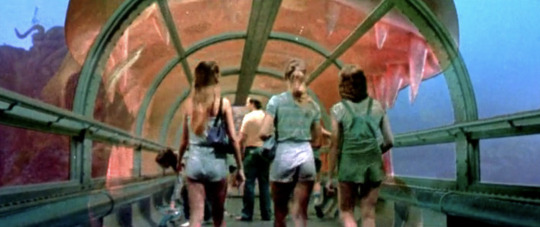
The film’s prominent SeaWorld product placement is, theoretically, ill-advised, especially in the post-Blackfish era; in practice, it’s extremely productive. The opening stretches have a lot of water-skiing; in deep 3D, the water-skiers serve as lines tracing depth towards and away from the camera over a body of water whose horizon line stretches back infinitely, producing a greater awareness of space. It reminded me of the early days of the short-lived super-widescreen format Cinerama, as described by John Belton in his academic history book Widescreen Cinema (recommended). The very first film in the format, This is Cinerama, was a travelogue whose stops included Cypress Gardens, Florida’s first commercial tourist theme park (the site is now a Legoland), which has very similar images of waterskiiers. Cinerama was, per the publicist copy Belton quotes from the period, about an experience, not a story: “Plot is replaced by audience envelopment […] the medium forces you to concentrate on something bigger than people, for it has a range of vision and sound that no other medium offers.” Cinerama promised to immerse viewers, as literalized in this delightful publicity image; Belton argues that “unlike 3-D and CinemaScope, which stressed the dramatic content of their story material and the radical new means of technology employed in production, Cinerama used a saturation advertising campaign in the newspapers and on radio to promote the ‘excitement aspects’ of the new medium.” There’s a connection here with the earliest days of silent cinema, short snippets (“actualities”) of reality, before it was decided that medium’s primary purpose was to tell a story. It didn’t have to be like that; in those opening stretches, Jaws 3-D’s lackadaisical narrative, which might play inertly on TV, recalls the 1890s, when shots of bodies of water were popular subjects. This is something I learned from a recent presentation by silent film scholar Bryony Dixon, and her reasoning makes sense. The way water moves is inherently hypnotic, and for early audiences assimilating their very first moving images, water imagery was a favorite subject. It’s only with a few years under its belt that film started making its drift towards narrative as default; inadvertently or not, Jaws 3-D is very pure in its initial presentation of water as a spectacular, non-narrative event.
If this seems like a lot of cultural and historical weight to bring to bear upon Jaws 3-D, note that it wasn’t even my favorite of the more-scorned offerings I saw that weekend, merely one that makes it easiest for me to articulate what I found compelling about the 3D immersion experience. I haven’t described the plot of Jaws 3-D at all, which is indeed perfunctory (though it was nice to learn where Deep Blue Sea cribbed a bunch of its production design from). I won’t try to rehabilitate Amityville 3-D at similar length: set aside the moronic ending and Tony Roberts’ leading turn as one of cinema’s most annoyingly waspish, unearnedly whiny divorcees, and what’s left is a surprisingly melancholy movie about the frustrations, and constant necessary repairs, of home ownership. There’s very little music and a surprising amount of silence. The most effective moment is simply Roberts going upstairs to the bathroom, where steam is hissing out for no apparent reason and he has to fix the plumbing. The camera’s planted in the hallway, not moving for any kind of emphasis as the back wall moves closer to Roberts; it doesn’t kill him and nothing comes of it, it’s just another problem to deal with (the walls, as it were, are settling), made more effective by awareness of how a space whose rules and boundaries seemed fixed is being altered, pushing air at you.
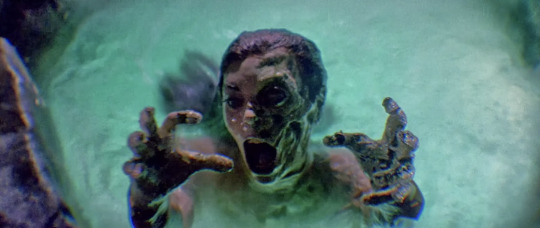
Watching a bunch of these in sequence, some clear lessons emerge: if you want to generate compelling depth by default, find an alleyway and block off the other half of the frame with a wall to present two different depths, or force protagonists to crawl through ducts or tubes. This is a good chunk of Silent Madness, a reasonably effective slasher film that, within the confines of its cheap sets and functional plotting, keeps the eye moving. It’s an unlikely candidate for a deep-dive New York Times Magazine article from the time period, which is well worth reading in full. It’s mostly about B-movies and the actresses trying to make their way up through them, though it does have this money quote from director Simon Nuchtern about why, for Bs, it’s not worth paying more for a good lead actress: “If I had 10,000 extra dollars, I’d put it into lights. Not one person is going to say, ‘Go see that movie because Lynn Redgrave is in it.’ But if we don’t have enough lights and that 3-D doesn’t pop right out at you, people are going to say, ‘Don’t see that movie because the 3-D stinks.’” Meanwhile, nobody appears to have been thinking that hard while making Friday the 13th: Part III, which contains precisely one striking image: a pan, street morning, as future teen lambs-to-the-slaughter exit their van and walk over to a friend’s house. A lens flare hits frame left, making what’s behind it briefly impossible to see: this portion of the frame is now sealed off under impermeable 2D, in contrast to the rest of the frame’s now far-more-tangible depth. The remainder of the movie makes it easy to imagine watching it on TV and clocking every obvious, poorly framed and blocked 3D effect, from spears being thrown at the camera to the inevitable yo-yo descending at the lens. (This is my least favorite 3D effect because it’s just too obvious and counterproductively makes me think of the Smothers Brothers.)
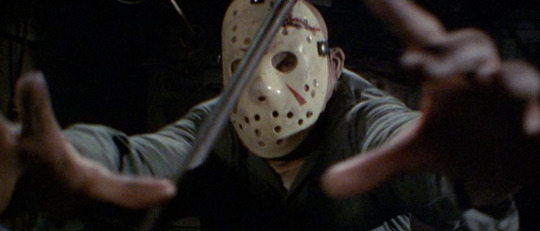
Friday the 13th was the biggest slog of the 3D weekend, and the one most clearly emulating 1981’s Comin’ at Ya! I am not going to argue for that movie, either, which is generally credited with kicking off the second 3D craze; it’s a sludgy spaghetti western that delivers exactly as its title promises, using a limited number of effects repeatedly before showing them all again in a cut-together montage at the end, lest you missed one in its first iteration. It’s exhausting and oddly joyless, but was successful enough to generate a follow-up from the same creative team. Star Tony Anthony and director Ferdinando Baldi (both veterans of second-tier spaghetti westerns) re-teamed for 1983’s Treasure of the Four Crowns, the movie which (two screenings in) rewired my brain a little and convinced me I should hang around all weekend. This is not a well-respected film, then or now: judging by IMDb user comments, most people who remember seeing it recall it playing endlessly on HBO in the ‘80s, where it did not impress them unless they were very young (and even then, perhaps not). Janet Maslin admitted to walking out on it in her review; then again, she did the same with Dawn of the Dead, and everyone loves that.
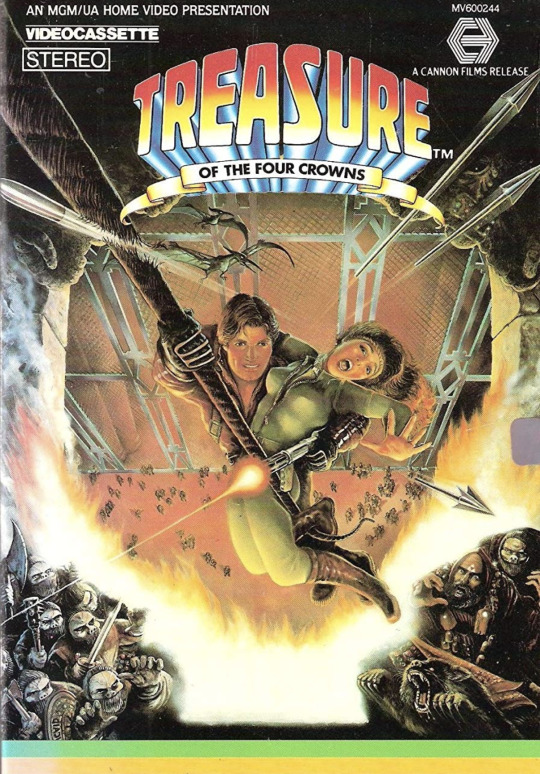
An unabashed Indiana Jones copy, Treasure begins strong with a lengthy opening sequence of tomb raider J.T. Striker (Anthony) dropping into a cave, where he’s promptly confronted not only with a bunch of traps but, for a long stretch, a small menagerie’s worth of owls, dogs, and other wildlife. There are a lot of animals, and why not? They’re fun to look at, and having them trotted out, one after another, is another link back to silent cinema; besides water, babies and animals were also popular subjects. The whole sequence ends with Striker running away from the castle above the cave, artifact retrieved, in slow-motion as Ennio Morricone’s score blares. There is, inevitably and nonsensically, a fireball that consumes the set; it unfolds luxuriously in detailed depth, the camera placed on a grassy knoll that gives us a nice angle to contemplate it looking upwards, a nearly abstract testament to the pleasures of gasoline-fueled imagery. Shortly thereafter, Striker is in some European city to sell his wares, and in every shot the camera is placed for maximum depth: in front of a small city park’s mini-waterfall, views of streets boxed in by sidewalks that narrow towards each other, each position calibrated to create a spectacular travelogue out of what’s a fairly mundane location. There’s an expository sequence where Striker and friends drop into a diner to ask about the whereabouts of another member of the crew they need to round up. Here, with the camera on one side of a bar encircling a center counter, there are something like six layers of cleanly articulated space, starting with a plant’s leaves right in front of the lens on the side, proceeding to the counter, center area, back counter, back tables and walls of the establishment. Again, the location is mundane; seeing it filleted in space so neatly is what makes it special.
The climax finally convinced me I was watching forgotten greatness. This is an elaborate heist sequence in which, of course, the floor cannot be touched, necessitating that the team perform all kinds of rappelling foolishness. At this point I thought, “the only way I could respect this movie more is if it spent 10 minutes watching them get from one side of the room to another in real time.” First, the team has to gear up, which basically means untangling a bunch of ropes—clearly not the most exciting activity. The camera is looking up, placed below a team member as they uncoil and then drop a rope towards the lens. This is a better-framed variant of the comin’-at-ya principle, but what made it exciting to me was the leisurely way it was done: no more whizzing spears, but a moment of procedural mundanity as exciting as any ostensible danger. Basic narrative film grammar is being upended here: if a rope being dropped is just as exciting as a big, fake rip-off boulder chasing our hero down the cave, then all the rules about what constitutes narrative are off—narrative and non-narrative elements have the exact same weight, and even the most mundane, A-to-B connective shot is a spectacular event.
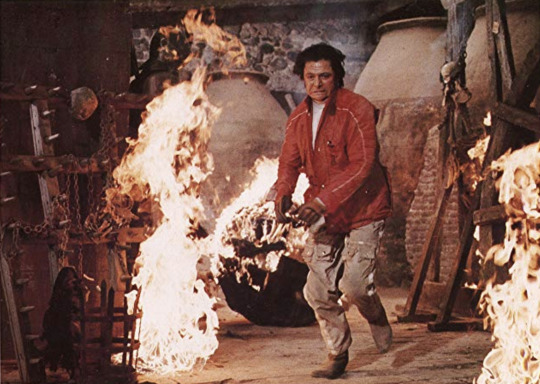
This isn’t how narrative cinema is supposed to work, and certainly not what James Cameron’s conception of good 3D proposed. The movie keeps going, building to a bizarrely grim climax involving a lot of face-melting, scored by Morricone’s oddly beatific score, which seems serenely indifferent to the grotesqueness of the images it’s accompanying. (This is a recurring trait in the composer’s ‘80s work; the score for White Dog often seems to bear no relation to the footage it’s accompanying.) That would make the movie oneiric and weirdly compelling even on a flat TV, but everything preceding convinced me: 3D can be great because it’s 3D, not because it serves a story. I’ve spent the last decade getting more angry about the format than anything, but that was a misunderstanding. Treasure of the Four Crowns is, yes, probably very unexceptional seen flat; seen in all three dimensions, it’s a demonstration of how 3D can turn banal connective tissue and routine coverage into an event. The spectacle of 3D might never have been its potential to make elaborate CG landscapes more immersive, something I still haven’t personally been convinced of; as those 19 non-CG shots in Avatar showed (undermining Cameron’s own argument!), 3D’s renderings of the real, material world and objects have yet to be fully explored. 3D’s ability to link film back to its earliest days is refreshing, in the way that any rediscovery of forgotten parts of film language can be, while also encouraging thought about all the things narrative visual language hasn’t yet explored, as if 3D could take us forwards and backwards simultaneously. In any case, I’m now won over—ten years after Avatar, but better late than never.
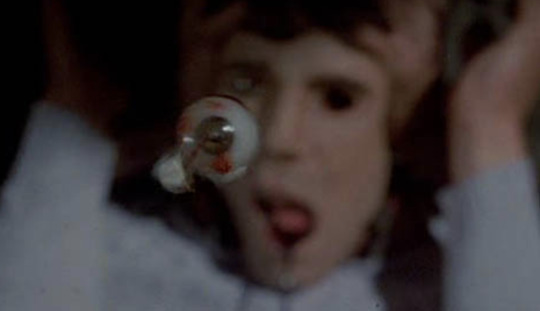
#3-d#3-d movie#3-d cinema#treasure of the four crowns#avatar#this fashion insider’s new modern engagement ring is making jaws drop#jaws 3d#friday the 13th part iii#cinemascope#cinerama#cypress gardens#widescreen#amityville 3d#scarface#never say never again#run for cover#oscilloscope laboratories#film writing#film essay#o-scope labs#musings#beastie boys
10 notes
·
View notes
Text
Artist News | July Part I

‘Tis the season for being outside and indulging in art!
Whether you are attending a performance or enjoying a movie night or gallery opening, let NYFA guide your journey. Let us know you are enjoying our artists’ work by using the hashtags #NYSCANYFAFellow and #NYFAFiscalSponsorship!
Things to do & see in NYC:
luciana achugar (Fellow in Choreography '08, '16) luciana achugar will participate in the conversation Intersectional Feminism: Histories, Strategies, and Imagined Futures. When: July 7, 2017, 7:00 PM Where: A.I.R. Gallery, 155 Plymouth Street, Brooklyn, NY 11201
Jennifer Wen Ma (Sponsored Project) Jennifer Wen Ma’s Eight Views of Paradise Interrupted fuses aspects of traditional Chinese art with a distinctly contemporary approach with delicate, ephemeral installations. When: Now through July 28, 2017 Where: Sandra Gering Inc., 14 East 63rd Street, New York, NY 10065
Svea Schneider (Sponsored Project) INSITU Site-Specific Dance Festival takes over the streets of Long Island City, transforming the Queens waterfront into one big stage for movement artists. When: July 8 & 9, 2017, 12:00 PM - 7:00 PM daily Where: Various locations along the Long Island City waterfront. Plan your visit here. According to The New York Times, this is one of the "24 Outdoor Performances to See This Summer."
Audrey Logan (Sponsored Project) Catch a free screening of The New Regular’s "Locality," a hyperlocal web series spotlighting Crown Heights, Brooklyn. When: July 11, 2017, 8:00 PM - 9:00 PM Where: Two Saints, 753 Nostrand Avenue, Brooklyn, NY 11216
Glendalys Medina (Fellow in Interdisciplinary Work '12) Odetta Gallery is pleased to present Linda Cunningham: Whose Land, Whose God? The show will feature two artists from the gallery’s flat files, including Medina. When: Opening Reception: July 13, 2017, 6:00 PM - 8:00 PM; now through August 20, 2017 Where: Odetta Gallery, 229 Cook Street, Brooklyn, NY 11206
Debi Cornwall (Sponsored Project) Debi Cornwall’s photographs from Welcome to Camp America will be a part of this year’s Aperture Summer Open, On Freedom. When: Opening: July 13, 2017, 7:00 PM; July 14, 2017 - August 17, 2017 Where: Aperture Foundation, 547 West 27th Street, 4th Floor New York, NY 10001
Caribbeing (Sponsored Organization) I AM CARIBBEING’S Pop-Up Experience gathers a handful of Caribbean-made and Caribbean-inspired products so attendants can shop a curated selection of ART + CULTURE + WELLNESS goods. When: July 14, 2017 - July 28, 2017; Thursday: 4:00 PM - 8:00 PM, Friday: 4:00 PM - 8:00 PM, Saturday: 12:00 PM - 8:00 PM, Sunday: 1:00 PM - 5:00 PM Where: CARIBBEING HOUSE, 794 Flatbush Avenue, Brooklyn, NY 11226
Dawoud Bey (Fellow in Photography '86, '90), Phyllis Galembo (Fellow in Photography '96, '10, '16), and Glendalys Medina (Fellow in Interdisciplinary Work '12) Bey, Galembo, and Medina will be a part of the show Harlem Postcards, which is an ongoing project that invites contemporary artists of diverse backgrounds to reflect and represent the intimate and dynamic perspectives of Harlem. When: July 19 - September 10, 2017 Where: Harlem Studio Museum, 144 West 125th Street, New York, NY 10027
Nari Ward (Fellow in Poetry '86, Sculpture '07) Till, Lit is Ward’s fourth solo exhibition at Lehmann Maupin, debuting a series of new work comprised of mixed media paintings, sculptures, and installations. When: Now through August 25, 2017 Where: Lehmann Maupin, 536 West 22nd Street, New York, NY 10011
Simone Leigh (Fellow in Sculpture '09) The Studio Museum’s inHarlem is a public sculpture project within Harlem’s quartet of historic parks. Leigh’s sculptural work can be found at Marcus Garvey Park. When: Now through July 25, 2017 Where: Marcus Garvey Park, 18 Mount Morris Park West, New York, NY 10027
Judith Barry (Fellow in Conceptual/Performance Art '86, '90, '97) Imagination, Dead Imagine is an exhibition of work installation with sound and video projection curated by Piper Marshall. When: Now through July 28, 2017 Where: Mary Boone Gallery, 541 West 24th Street, New York, NY 10151
Artmakers, Inc. (Sponsored Organization) The exhibition La Lucha Continua: The Struggle Continues shares political murals from 1985 and 2017 addressing gentrification, police brutality, immigration, feminism, and opposition of U.S. intervention in Central America and apartheid in South Africa. When: Now through July 31, 2017 (Thursday, Friday, & Saturday) Where: The Loisaida Center, 710 East 9th Street, New York, NY 10009
Sanford Biggers (Fellow in Performance '05) and LoVid (Fellow in Interdisciplinary Work '09) The Children’s Museum of the Arts presents Maker, Maker, a group exhibition that explores the recent explosion of D.I.Y. Maker culture and the expanding relationship between fine art and craft. When: Now through September 10, 2017 Where: Children’s Museum of the Arts, 103 Charlton Street, New York, NY 10014
14 Sculptors Gallery (Sponsored Organization) 14 Sculptors Gallery joins the Rockaway art scene with their new exhibition, 14 Sculptures on the Rock. When: Now through October 9, 2017 Where: Rockaway Beach, 94th Street, Far Rockaway, NY 11693

Get out of town to see:
Aida Šehović (Sponsored Project) ŠTO TE NEMA Nomadic Monument investigates universal issues by commemorating one specific genocide: the systematic killing of 8,372 Bosnian Muslims in the UN-protected safe area of Srebrenica in July of 1995. Serving as an alternative to traditional monuments and memorials, ŠTO TE NEMA generates public memory through an annual nomadic monument. Permanent materials like stone and bronze are replaced with collected porcelain cups filled with coffee and passive viewers and bystanders are transformed into allies. Be sure to hashtag your visit with: #StoTeNema #monument #Srebrenica #NeverAgain #stotenemachicago2017 When: July 11, 9:00 AM - 9:00 PM Where: Daley Plaza, 50 West Washington Street, Chicago, IL 60602
John Van Alstine (Sponsored Project) John Van Alstine’s sculptures are now on view at The Laffer Gallery as part of the show Cartography & Choreography. When: Now through July 30, 2017 Where: The Laffer Gallery, 96 Broad Street, Schuylerville, NY 12871
Dolce Pinzón (Fellow in Photography '06) Dioramas is a cross-disciplinary exhibition exploring the diorama as a source of inspiration. It includes Pinzón’s Historias del Paraíso Series. When: Now through September 10, 2017 Where: Palais de Tokyo, 12 Avenue du Président Wilson, 75116 Paris, France
Glendalys Medina (Fellow in Interdisciplinary Work '12) Spots, Dots, Pips, Tiles, a group exhibition around the game of dominoes, has traveled from Hunter East Harlem Gallery to Miami, and will be on view at PAMM. When: Now through October 29, 2017 Where: Pérez Art Museum Miami, 1103 Biscayne Boulevard, Miami, FL 33132
Yukiyo Kawano (Sponsored Project) Kawano’s Suspended Moment, a sculptural installation that captures the nuclear war, magnified by a Butoh performance, soundscape, and poetry, will be performed in Los Alamos, New Mexico. When: July 16, 2017, 4:00 PM - 5:30 PM Where: Fuller Lodge, 2132 Central Avenue, Los Alamos, NM 87544
New releases to enjoy at home:
Sheila Callaghan (Fellow in Playwriting/Screenwriting '04) “(Not) Water: Sheila Callaghan, Daniella Topol, and the Slow-Building Wave of Collaboration” is an article discussing Callaghan’s most recent collaborative performance at 3LD Art & Technology Center. Where: The Brooklyn Rail, online
Chiori Miyagawa (Fellow in Playwriting/Screenwriting '84) “Parity, Politics, and Survival: WiTFESTNYC 2017” is an article discussing Miyagawa’s recent participation in the WiTFESTNYC, which showcased her play In The Line. Where: The Brooklyn Rail, online
The NYSCA/NYFA Artist Fellowship Program awards $7,000 grants to individual artists living and working in New York State, and NYFA’s Fiscal Sponsorship program enhances the fundraising capabilities of individual artists and emerging arts organizations.
Follow us on Twitter and Instagram for more events with NYFA affiliated artists. Also, don’t forget to like us on Facebook to see what current fiscally sponsored projects are up to! To receive more artist news updates, sign up for our biweekly newsletter, NYFA News.
Image Credits, from top: Photograph by Prin Rodriguez, image courtesy of INSITU Site-Specific Dance Festival; image courtesy of Aida Šehović
1 note
·
View note
Text
Artist News | August Part II

NYFA is proud to celebrate the achievements and perseverance of artists in NYC and beyond.
From new releases, to opening parties and extended shows, Artist News is a go-to guide about the happenings of NYSCA/NYFA Fellows and NYFA Fiscal Sponsorship projects. Share your experiences on social media tagging @nyfacurrent on Instagram, Twitter, and Facebook.
Things to do & see in NYC:
Dread Scott (Fellow in Sculpture ‘01/Performance ‘05/Interdisciplinary Work ‘12) A copy of Scott’s powerful and topical piece, A Man Was Lynched by Police Yesterday, has recently been acquired by the Whitney Museum, and is on display in the exhibition, An Incomplete History of Protests. When: August 18, 2017 - April 2018 Where: Whitney Museum of American Art, 99 Gansevoort Street, New York, New York 10014
Donna Henes (Fellow in Conceptual/Performance Art ‘86/Nonfiction ‘91) Mama Donna Henes invites participants to bring a candle to light or incense to burn for the Eclipse Fascism Purification Ritual she will be leading. When: 7:00 PM, August 21, 2017 Where: Grand Army Plaza Fountain, Brooklyn, New York
Cheryl Wing-Zi Wong (Finalist in Architecture/Environmental Structures/Design ‘16) Pinch, Fold, Cut, Line, is a new collaborative project by Henna-Riikka Halonen and Cheryl Wing-Zi Wong, and will be on view for one-day-only during the Triangle Summer Open Studios. When: August 24, 2017, 6:00 PM - 9:00 PM Where: Triangle Arts Association, 20 Jay Street, Suites 317/318, Brooklyn, New York 11201
Marie Poncé (Fellow in Choreography ‘16) Poncé will be leading the seminar Arts Business Tools for Thriving Artists and NonProfits, giving guidance for finding the tools and resources for building creativity into a business. RSVP here. When: August 25, 2017, 3:30 PM - 5:00 PM Where: Norwood Pharmacy Annex (enter on 133 St), 2490 Frederick Douglass Boulevard, New York, New York 10030
Andre Degas (Sponsored Project) Andre Degas’s House of Charity is a hyper realistic, racially and sexually charged drama set in a fast-paced working environment. The dark comedy addresses issue of addiction and recovery. Buy tickets. Running time: 90 minutes. Andre Degas’s film, Crossing the Line, is a NYFA Fiscal Sponsorship project. When: August 27, 2017 - September 13, 2017; See Showtimes. Where: Theater for the New City, Community Space Theater, 155 First Avenue, New York, New York 10003
caribBEING (Sponsored Organization) Visit caribBEING House at its month-long residency with the Brooklyn Museum and see the exhibition “Life with Basquiat” by Alexis Adler. When: Now through August 28, 2017 Where: Steinberg Family Sculpture Garden, 1st Floor, Brooklyn Museum, 200 Eastern Parkway, Brooklyn, New York 11238
Mary Mattingly (Sponsored Project) Visit Swale, an edible public food forest built atop a barge. When: Now through August 31, 2017, Fridays - Sundays, 1:00 - 7:00PM Where: Concrete Plant Park, Bronx, New York, 10472 (Bronx River bet. Westchester Ave. and Bruckner Blvd)
Sanford Biggers (Fellow in Performance ‘05) Dread Scott (Fellow in Sculpture ‘01/Performance ‘05/Interdisciplinary Work ‘12) Clarissa T. Sligh (Fellow in Photography ‘88/’00/Printmaking/Drawing/Artists’ Books ‘05) There are a few weeks remaining to see the Brooklyn Museum’s exhibition, The Legacy of Lynching: Confronting Racial Terror in America, which uses work from the Museum’s collection to spark conversation about the legacy of racial injustice in America today. When: Now through September 3, 2017 Where: Robert E. Blum Gallery, 1st Floor, Brooklyn Museum, 200 Eastern Parkway, Brooklyn, New York 11238
Steed Taylor (Fellow in Painting ‘02/Sculpture ‘07) Sew and Sew is a 400-foot long road tattoo, stretching across two blocks of Broadway. It was commissioned by the Garment District Alliance with support from the NYC DOT Art Program. This section of Broadway will be vehicle-free, but viewers are invited to walk and bike over the work. When: Now through September 4, 2017 Where: Garment District Plaza, Broadway, between 41st Street & 36th Street, New York
Sanford Biggers (Fellow in Performance ‘05) LoVid (Fellow in Interdisciplinary Arts ‘09) The Children’s Museum of the Arts presents Maker, Maker, a group exhibition that explores the recent explosion of D.I.Y. Maker culture and the expanding relationship between fine art and craft. When: Now - September 10, 2017 Where: Children’s Museum of the Arts, 103 Charlton Street, New York 10014
Lesley Dill (Fellow in Printmaking/Drawing/Artists’ Books ‘95) Mimi Gross (Fellow in Painting ‘85) Julie Heffernan (Fellow in Painting ‘96) Faith Ringgold (Fellow in Painting ‘88) Alison Saar (Fellow in Sculpture ‘85) Forum Gallery Inc. presents, Seeing With Our Own Eyes, a group exhibition of 24 paintings, drawings and sculptures representing works by progressive women artists. When: Now through September 29, 2017 Where: Forum Gallery, 475 Park Avenue, New York, New York 10022
14 Sculptors Gallery (Sponsored Organization) 14 Sculptors Gallery joins the Rockaway art scene with their new exhibition, 14 Sculptures on the Rock. When: Now through October 9, 2017 Where: Rockaway Beach, 94th Street, Far Rockaway, New York 11693

Get out of town to see:
Marla Mossman (Sponsored Project) Marla Mossman will be giving a multimedia presentation at the Praxis Conference DC incorporating photographs and video footage from the Peace Caravan Project. The conference’s theme is Peacebuilding Among Youth in Conflict. Register for the event. When: Friday, August 18 - Saturday, August 19, 2017 Where: George Mason University, 3351 N. Fairfax Drive MSN 4D3 Arlington, VA 22201
Dread Scott (Fellow in Sculpture ‘01/Performance ‘05/Interdisciplinary Work ‘12) I, Too, Am American, features artworks that tackle issues including the Civil Rights Movement, feminism, and LGBT rights, respectively, reminding us of how artists have responded to turbulent times throughout American history. When: August 18 - November 26, 2017 Where: John Brady Print Gallery, Des Moines Art Center, 4700 Grand Avenue, Des Moines, Iowa 50312
Chad Weckler (Sponsored Project) Hudson Summer Fest will be a day filled with festivities, live music, and food for the whole family. Buy tickets here. When: August 19, 2017 from 11:00AM - 7:00PM Where: Henry Hudson Riverfront Park, Hudson, New York
Liliana Porter (Fellow in Graphics ‘85/Film ‘99) Sicardi Gallery presents Liliana Porter: The Order of Things and Other Works, which includes a selection of installations, photographs, and mixed media work. This show coincides with Porter’s exhibition at the Arsenale in the 57th Venice Biennale. When: Extended through August 24, 2017 Where: Sicardi Gallery, 1506 West Alabama Street, Houston, Texas 77006
Kathleen Foster (Sponsored Project) See a screening of PROFILED, a timely documentary on racial profiling and police brutality. Panel discussion to follow. When: August 26, 2017 from 1:00 PM - 3:00 PM Where: The Newark Public Library, 5 Washington Street, Newark, NJ 07102
Linda Mary Montano (Fellow in Conceptual/Performance Art ‘86) Oracle is a performance comprised of artists exploring themes of truth and spirituality during a time of anxiety, globalism, and absurdity. Buy Tickets Here. When: August 26, 2017, 8:30 PM Where: The Broad, 221 South Grand Avenue, Los Angeles, California 90012
Boora Yoon (Fellow in Music/Sound ‘10) The 14th annual Carlsbad Music Festival is a 3-day summer celebration of adventurous music by the beach. Yoon will be performing as part of the Mainstage Concerts. When: August 25 - August 27, 2017 Where: Saint Michael’s by the Sea, 2775 Carlsbad Boulevard, Carlsbad, California 92008
Dread Scott (Fellow in Sculpture ‘01/Performance ‘05/Interdisciplinary Work ‘12) Lenin Lives is a group show exploring the afterlife of the first Soviet leader, Vladimir Ilyich Ulyano-Lenin. The artists exhibited experiment with canonical images of Lenin, altering meaning and interpretation through different mediums. When: August 17 - October 8, 2017; Opening reception: August 31, 2017, 7:00 - 8:30 PM Where: The Van Every/Smith Galleries, 315 North Main Street, Davidson, North Carolina 28035
Dread Scott (Fellow in Sculpture ‘01/Performance ‘05/Interdisciplinary Work ‘12) Bold Disobedience is a group exhibition of artists demonstrating myriad social issues that matter to youths today. When: Now through September 1, 2017 Where: Weinberg/Newton Gallery, 300 West Superior Street, Suite 203, Chicago, Illinois 60654
Chang-Jin Lee (Sponsored Project) Chang-Jin Lee’s Comfort Women Wanted is a part of the exhibition, “Do the Right Thing: (dis)comfort women”. The exhibition reflects on the silence and dialogue by and about the women who were forced to become sex slaves by the Japanese Imperial Army before and during World War II. When: Now through September 3, 2017 Where: ReflectSpace, Downtown Central Library, 222 East Harvard Street, Glendale, California 91205
Andres Serrano (Fellow in Photography ‘87) Revealing Reality is the first large Dutch exhibition of Serrano’s work in twenty years, showcasing photographs drawn from his early series. When: Now through September 3, 2017 Where: Huis Marseille, Keizersgracht 401, 1016 EK Amsterdam, Netherlands
Dulce Pinzón (Fellow in Photography ‘06) Dioramas is a group exhibition that explores the diorama as an unexpected source of inspiration for contemporary art. When: Now through September 10, 2017 Where: Palais de Tokyo, 13 Avenue du Président Wilson, 75116 Paris, France
New Releases to Enjoy at home:
Michael Placek (Sponsored Project) A short film, “A Walking History” is now available as premiered on Nowness. The film highlights artist Julian Schnabel as he reveals his new exhibition, “Paintings That I Hope Philip and David Would Like.” Placek is fiscally sponsored for his project Portrait of Yoko Ono. Where: Available on demand from Nowness.com
Jodi Savitz (Sponsored Project) Girl on Girl is a feature-length documentary that follows the stories of feminine lesbians who, even after coming out, feel invisible and stigmatized. A staff pick on Vimeo, this film delves into the stories and experiences of a diverse cast. When: Available now on demand. Where: Rent or purchase here.
Dread Scott (Fellow in Sculpture ‘01/Performance ‘05/Interdisciplinary Work ‘12) Scott is featured in a recent Newsweek article titled, “What It Means To Be Black In America: ‘Slavery Didn’t End in 1865. It Evolved,’” which discusses The Brooklyn Museum’s current exhibition, The Legacy of Lynching: Confronting Racial Terror in America. When: Published July 29, 2017 Where: Online: Newsweek
Samira Abbassy (Fellow in Printmaking/Drawing/Artists’ Books ‘07) Kwesi Abbensetts (Fellow in Photography ‘16) Geoffrey Chadsey (Fellow in Printmaking/Drawing/Artists’ Books ‘11) Sean Fader (Fellow in Photography ‘13) Michael Ferris Jr. (Fellow in Sculpture ‘09) Kymia Nawabi (Fellow in Printmaking/Drawing/Book Arts ‘09/’17) Oliver Wasow (Fellow in Photography ‘89/’00) Quiet Lunch Magazine highlights the current group show, Facial Profiling, curated by David C. Terry in collaboration with NYFA at C24 Gallery. Where: Online: “Facial Profiling. | Group Show at C24 Gallery,” Quiet Lunch
Kwesi Abbensetts (Fellow in Photography ‘16) Quiet Lunch Magazine spotlights Abbensetts’ recent first solo exhibition, Water Me, at Brilliant Champions Gallery. Where: Online: “Water Me. | Kwesi Abbensetts at Brilliant Champions Gallery,” Quiet Lunch
Patricia Horvath (Fellow in Nonfiction ‘07/Fiction ‘15) Published by Etruscan Press, Horvath’s memoir, All the Difference, follows her personal experiences, intertwined with the literature of physical transformation and how folk and fairy tales shape our attitudes towards the disabled. Where: Etruscan Press and other retailers
Terry Berkowitz (Fellow in Photography ‘10) Francesc Torres (Fellow in Conceptual/Performance Art ‘86/Performance ‘01) Berkowitz and Torres are featured in La Voz de Galicia article, “Abundancia e parábola,” written by Francisco X. Fernández Naval. Where: Online; La Voz de Galicia
Martha Wilson (Fellow in Performance Art/Multidisciplinary Work ‘01) Wilson is featured in The Village Voice article “Leo Fitzpatrick: The Kid Stayed in the Picture,” written by Mallika Rao. Where: Online; The Village Voice
Fran Antmann (Sponsored Project) Maya Healers: A Thousand Dreams was recently published by Nirala Publications. It is a unique book of photographs and writing that explores the power and mystery of indigenous healing practices among the Maya people of Guatemala. When: Available Now Where: Purchase here.
The NYSCA/NYFA Artist Fellowship Program awards $7,000 grants to individual artists living and working in New York State, and NYFA’s Fiscal Sponsorship program enhances the fundraising capabilities of individual artists and emerging arts organizations.
Follow us on Twitter and Instagram for more events with NYFA affiliated artists. Also, don’t forget to like us on Facebook to see what current fiscally sponsored projects are up to! To receive more artist news updates, sign up for our biweekly newsletter, NYFA News.
Images, from top: courtesy of Kathleen Foster, project director of PROFILED (Sponsored Project). From film still and panel discussion for PROFILED in Brooklyn, NY 2016.
0 notes